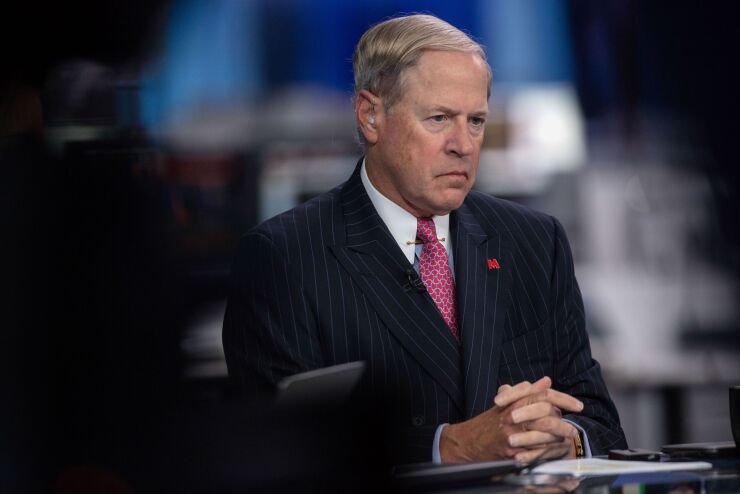A strategic review committee established by Republic First Bancorp in Philadelphia to evaluate parties that have expressed interest in acquiring the $5.8 billion-asset company apparently does not include chairman and CEO Harry Madonna, who would profit from any sale.
The disclosure came Monday following loud protests from former chairman and CEO Vernon Hill and two activist investor groups. Hill was
Republic First said in a statement that its review "is in its early stages." It named the committee members as lead independent director Harris Wildstein, along with directors Andrew Cohen, Lisa Jacobs and Benjamin Duster.
Republic First also acknowledged receipt of a takeover offer by an activist investor group led by New Jersey insurance executive George Norcross and former TD Bank CEO Greg Braca. The Norcross-Braca group reiterated an offer it had made previously, to invest $50 million in convertible preferred shares priced at $3.25 per share, and to conduct a second-step transaction, buying from individual investors at $3.25 to $3.50 per share.
According to a letter the Norcross-Braca group made public Thursday, the offer provides Republic First with a much-needed capital injection while providing liquidity to investors seeking an exit point. The offer also gives the group the opportunity to acquire up to 45% of the company's stock, as well as undisputed control.
The Norcross-Braca group
Republic First promised to study the Norcross-Braca group's proposal and said it had instructed Keefe, Bruyette & Woods, which is advising the company, "to engage with the Norcross group's financial advisor."
A Republic First spokesman declined an interview request for this story.
Madonna's putative participation in the strategic review emerged as a hot-button issue following Republic First's disclosure earlier this month that it had
Much of the criticism centered around a clause in the 79-year-old Madonna's contract that provides him with a $1 million payout in the case of a merger or the transfer of a majority of stock.
Hill, who Madonna displaced as chairman and CEO, sued him and two colleagues on Republic First's board last week in the Court of Common Pleas for Philadelphia County. Hill's lawsuit alleges, among other things, that the trio of directors plan to sell Republic First at a fire-sale price that benefits them but harms "the vast majority of FRBK's shareholders" (FRBK is Republic First's ticker symbol on the Nasdaq stock market).
Hill was joined in his suit by Barry Spevak, another former Republic First director.
"The only way Mr. Madonna can avail himself of his golden parachute was to oust Mr. Hill, ignore the best interests of FRBK, and ensure that FRBK sells a majority interest no matter the price," Hill's lawsuit states.
In its letter last week, the Norcross-Braca group blasted Madonna for failing to take any actions that would benefit the company's investors.
"Incredibly, we have seen no movement on the very items shareholders expected the board would immediately move forward to address," the group wrote Thursday. "In fact, the company lacks as much transparency as before."

Abbott Cooper, founder and managing member of Driver Management Co., a New York-based investment fund and the leader of an investor group that helped derail a capital raise Hill proposed last year, initially welcomed the news of a possible sale. Last week, however, Cooper released a letter urging Republic First's board to keep Madonna out of any potential negotiations.
"I hope you can see that Mr. Madonna's service on the Strategic Review Committee creates an egregious conflict of interest," Cooper wrote in the letter, which was addressed to Harris Wildstein, the board's lead independent director.
"In addition, in the interests of much-needed transparency, the board should publicly disclose the members of the Strategic Review Committee and, if necessary, reconstitute the committee to exclude Mr. Madonna," Cooper added.
Cooper said Monday that he was pleased Madonna would not be serving on the strategic review committee, but added that the company's failure to make it clear from the beginning that Madonna would not participate was an "unforced error."
"They should have said from the start only independent directors" would serve, Cooper said. "We shouldn't have to wait until three different shareholders call them out on it."
In his lawsuit, Hill and Spevak are seeking undefined punitive and compensatory damages for alleged defamatory statements Madonna and his supporters on the board made during the long, bruising proxy battle.
Hill is also seeking at least $2.5 million from Republic First for breaching his employment contract by terminating his position as chairman without a contractually required 30-day written notice.
Hill, who was named as Republic First's chairman since December 2016, took over as CEO in February 2021. Hill employed the retail-oriented strategy he has championed throughout his career, which succeeded in attracting a significant amount of deposits. But critics, beginning with Cooper in October 2021, claimed the company wasn't generating enough profits to support the costs associated with an expanding branch network.
The Norcross-Braca group declared its opposition to Hill in February. Meanwhile, Madonna, who founded Republic First in 1988 and preceded Hill as chairman and as CEO,
Ironically, despite the turmoil that has enveloped Republic First for the past year, its bank subsidiary, which does business as Republic Bank, was able to improve its position in its home Philadelphia marketplace slightly. The bank boosted its share of the region's $599 billion deposit market to 0.80% on June 30, up from 0.70% a year ago, according to Federal Deposit Insurance Corp. statistics.
Monday's news hasn't helped the company's share price, however. It was trading at $2.90 midday on Monday, down 2.4% from Friday's close and 24% since the start of 2022.






